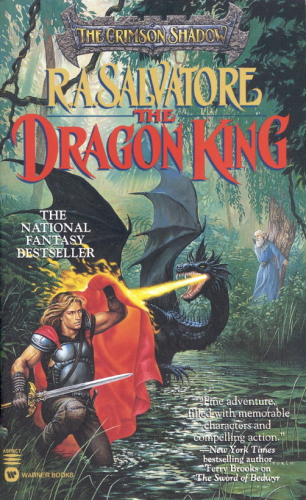
The Dragon King
Crimson Shadow Series, Book 3
کتاب های مرتبط
- اطلاعات
- نقد و بررسی
- دیدگاه کاربران
نقد و بررسی

November 4, 1996
Plenty of sound and fury but precious little fire rumbles in the belly of Salvatore's pseudo-Tolkien conclusion to the Crimson Shadow trilogy. Here, Avon's foppish evil wizard-king, Greensparrow, and his dragon alter ego provoke Eriador's wizard-king, Brind'Amour, into breaking the flimsy truce achieved in Luthien's Gamble (Forecasts, Jan. 29). Though badly outnumbered by Avon's "cyclopians," Brind'Amour and his assorted allies assault Avon to free Eriador forever. With the help of Luthien (whose magic alter ego is the Crimson Shadow), Katerin (the Shadow's warrior-maid lover), Siobhan (a revengeful half-elf rape victim), Oliver (a mouthy half-pint "halfting") and a flotilla of nouveau Vikings, the wizard-king slashes through acres of monsters and sloshes through torrents of gore. Despite the rivers of blood, however, Salvatore's vocabulary and imagination prove dry. Supposedly noble characters "smirk," "snicker" and "bat their eyes," and no cliche is left unused: even Saddam Hussein is paraphrased for the coming "grandfather of those battles." Salvatore's tired story depends on gratuitous violence and misused motifs from classic sources (Tolkien's Luthien was a fetching Elf-princess, for example, not a male hero with a fragile ego). These lumbering false steps make Salvatore stumble badly in his attempts to evoke memories of Middle Earth.

July 1, 1996
Wrapping up the best-selling "Crimson Shadow" trilogy.

October 1, 1996
In the conclusion to Salvatore's series, The Crimson Shadow, King Brind'Amour now rules Eriador, and Avon's King Greensparrow is trying to alter that with both swords and sorcery. Luthien Bedwyr, both in his own right and in his alternate persona, the Crimson Shadow, has a critical role to play in organizing and leading Eriador's resistance. The contest is long and fierce, the action nonstop, Greensparrow's ultimate weapon actually quite impressive and even terrifying, and the whole book well up to the standards set by its predecessors. Although he is not the kind to extend the frontiers of literary consciousness, Salvatore reliably delivers intelligent, fast-moving, entertaining fantasy that makes sound use of classic elements, including in this case, of course, the Robin Hood tales. ((Reviewed Oct. 1, 1996))(Reprinted with permission of Booklist, copyright 1996, American Library Association.)

























دیدگاه کاربران